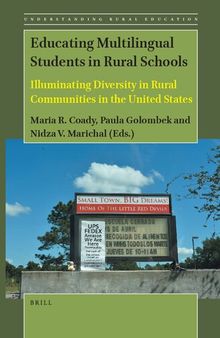 جزییات کتاب
جزییات کتاب
Illuminating issues of diversity at the intersection of rural education and multilingual learners (ML) in the United States, this edited volume brings forth new research that captures the importance of place and rurality in the work of educators who serve multilingual learners and their families. The six chapters in this book demonstrate that education for teachers, leaders and staff, professional development programs, and government-funded projects aimed to improve rural education need to begin with three interrelated, multifaceted principles. The first principle is the need to center place and rurality as essential factors that affect education for all educators, students, and families who live, work, and attend schools in rural communities. Second, educators must humanize multilingual students, their families, and their cultures in ways that go beyond merely acknowledging their presence - they must deeply see and understand the lives and (hi)stories of the multilingual students and families that they serve in their rural schools. Finally, the third principle involves identifying multilingual resources for ML students and their families. Given the persistent inequities in access to resources and opportunities that rural ML students and families face, this last principle requires careful planning, networking, and advocating in ways that can truly effectuate change. Contributors are: Jioanna Carjuzaa, Maria R. Coady, Paula Golombek, Shuzhan Li, Kristin Kline Liu, Nidza V. Marichal, Charity Funfe Tatah Mentan, Kym O'Donnell, Stephanie Oudghiri, Darrell Peterson, Sonja Phillips, Jenelle Reeves and Yi-Chen Wu.



 دانلود کتاب
دانلود کتاب

 جزییات کتاب
جزییات کتاب





 این کتاب رو مطالعه کردید؟ نظر شما چیست؟
این کتاب رو مطالعه کردید؟ نظر شما چیست؟
